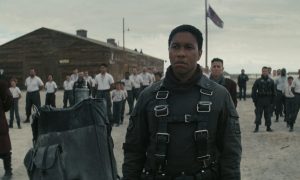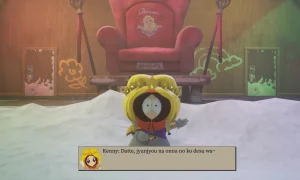A friend of mine once sent me an article about how genre fiction needs to be about characters. It made the further point that science fiction often loses its way while exploring fantastic concepts, and aspiring writers would be wise to avoid such pitfalls. I find this line of thought to be symptomatic of current popular culture, which demonstrates little interest in delving below the surface layers of almost anything. Explorations of futuristic ideas used to be the soul of sci-fi. Now it is relegated to the background setting, like pictures hung on the wall.
Contemporary sci-fi tends toward mass appeal. J.J. Abrams’ awful Star Trek films were made for Star Wars fans, betraying two generations of die-hard loyalists who had grown up embracing Gene Roddenberry’s vision and all the techno-speak that went with it. Don’t even get me started on last year’s big hit, Interstellar. That film was maybe the worst piece of garbage ever to be labeled science fiction, insulting theatergoers by answering all of its inane questions with the word, “gravity.” It is the laziest kind of tripe, mass produced and mass consumed, like fast-food hamburgers, and just as easily forgotten.
Classic sci-fi is about ideas. Arthur C. Clarke observing the lunar sunrise from a vantage point on the Moon, Robert Heinlein examining the tactics of raiders engaging space freighters, Isaac Asimov testing his three laws of robotics, and Philip K. Dick challenging the reader with a simple question, “What is real?” That kind of writing is intended for the intelligent consumer – someone who shares a passion for thought experiments, with little need for complex character interaction. Indeed, characters are the means to progress through complex ideas, and are sometimes written with near indifference.

Season one of Halt And Catch Fire was more like classic science fiction. It examined what it would take for a small company of misfits to build a computer and compete with IBM. It was executed beautifully, with a color palette anyone with modest roots in the Eighties can identify with. The characters are at times unsympathetic, but what they are trying to accomplish feels real. It conveyed emotional impact through those forces that the characters struggled to control, rooted in a singular concept, concrete and tangible. That emotion was raw, but perhaps it only played to that small group of us that was invested primarily in the thing they were working toward – the practical procedure of building and selling the Giant.
As a society, we have become emotionally charged. Children and adults alike are taught to be more empathetic, more tolerant, and less individualistic. That is not necessarily bad, but is has unintended consequences. We are more susceptible than we once were to language which tugs our heartstrings or boils our blood, and as a result, there’s so much more of that language. When was the last time you heard a political candidate give a speech and not include some personal anecdote about a family in need? It was probably from a Republican, but even they are playing the game now. Similarly, news stories are more often than not overlaid with examples of how real people claim to be affected. We are forced to relate; we are forced to care. Then we are measured by our “emotional IQ,” as if there was some way to actually do that.
Fiction television has followed suit. Sure, the abundance of formulaic police, doctor, and lawyer shows indicate Americans still want to be spoon fed a small amount of uncomplicated intrigue, but the shows that are deemed by critics to be “good” are those that test our capacity as emotional beings. What differentiates those offerings is the manner in which they also test our attachment to longstanding societal mores.
I offer into evidence season two of Halt And Catch Fire. Chris Cantwell and Chris Rodgers created the show, and their genius is on frequent display throughout season one, grounding story arcs in aesthetic and technological accuracy, creating a specific ambiance that appeals to a highly specific audience. I related to their vision of 1983. That was my childhood, they got it exactly right and made no excuses. Unfortunately, 500,000 weekly viewers is not good enough to justify the Sunday night timeslot, even during summer.

Showrunner Jonathan Lisco gained influence once the series was renewed. He is foremost an AMC guy, with a contract that continues with or without Halt And Catch Fire. I get the sense from his interviews that he is minimally invested in the show and looking to the future and his own signature project. For his part, he likes to both pose and then challenge the assumption that Halt And Catch Fire is for “eggheads.” My emotional education must be progressing, because I am insulted by that characterization.
But that connotation, in a nutshell, is what is wrong with season two. It has become a show less about ideas which the characters orbit around and more about the untethered decisions the characters must make and the consequences of those decisions. It feels shoehorned into the 1985 setting, with a lot of the action happening at the Victorian-style home which serves as Mutiny’s base of operations. It’s as if the characters and the locations are winking at the Eighties while looking toward a future they could not possibly anticipate. Typical of this treatment are Joe’s frequent ramblings, smacking of William Gibson, complete with all the pretentious abstraction necessary to talk about the past as if it were the future and expect the audience to buy in.
Lisco, either by his own volition or with urging from AMC brass, de-emphasized the technology themes and the aesthetic in an attempt to broaden the appeal. Combined with shameless pandering to critics, the show managed to coerce positive commentary from industry insiders and self-proclaimed gurus of the modern television drama. Yet the expected gains in viewership never materialized. In fact, ratings were down from season one.
The problem is obvious. By insulting the core fan base of the show and placing greater importance on viewers’ emotional IQ than their actual IQ, Lisco stripped from Halt And Catch Fire the elements which made it unique and compelling. It still played to Gen X nostalgia but ignored Gen X principles. We are the generation straddling the the analog and digital worlds, and our fondness for the pre-digital era cannot be dismissed out of hand. We read Asimov, Clarke, Le Guin, and Bear, but were too young for Gibson’s postmodernism. We built forts, kicked rubber balls, skated at dimly-lit roller rinks, and listened to Journey and REO Speedwagon while playing Gauntlet at the arcade. We played checkers, chess, Clue, and the old-school version of Life where you could take revenge. We were unsupervised, unburdened by excessive after-school activities except for cartoons, and taught the realities of life through first-hand, in-person experiences. We believed in Santa Claus, the Easter Bunny, the Tooth Fairy, and heaven. We were taught shame, guilt, manners, and boundaries. We believed in good and evil, and right and wrong founded in absolute moral truths. We took the world at face value, and were made cynical by it, and when the Internet changed everyone’s perception it orphaned us from our youth.
Season one of Halt And Catch Fire was made for us. It was made for me, and I loved it. Season two was made for everyone and no one, with the hope that I would keep watching. I did, but others like me did not, and I don’t blame them. I blame Lisco for not understanding his own show, and AMC for failing to see the small but flawless diamond it kept gleaming faintly in the dark. Lisco should have known better – he is one of us.

A case could be made that season two was about Community, Donna’s brainchild to bring people together “online” (as if that was part of anyone’s vocabulary in 1985). Episode 8, “Limbo,” kicks off with a party for Mutiny subscribers, most of whom are exclusively Community addicts. As if answering the question, “What the hell is this season about?” a teenage girl tells Cameron that the online world made her feel valued and probably saved her life. The first millennial.
Joe and Sara drop the bomb on Jacob Wheeler that they got married, then Joe promptly resigns. He seems unburdened, and gives a fake apology of how things went down with Mutiny. Jacob seems to brush it off, but only because he’s got a contingency. After Joe gets back from his honeymoon, Jacob brings him in to meet his replacement, a go-getter from California with all the answers. Turns out one of those answers is to replicate Mutiny’s interface and steal its subscribers.

Meanwhile, Sara proves that she is little more than a foil for Joe, producing a bag of ecstasy and enticing Joe into a night of carefree partying. Joe babbles about the future again. It’s like every college bar stool conversation I ever had about the meaning of life. I’m not sure what is accomplished during this sequence except to further confuse Joe’s direction as a character. Is he a misunderstood genius or a high-functioning sociopath? A hero or a villain? Can he be both?
Gordon is going completely nuts. When his team of engineers abandons him just as business is picking up, he believes his old buddy Stan has stolen his idea and is building custom PCs out of his garage. Gordon breaks in but finds only used machines. Stan confronts him, explaining that he washed out in Silicon Valley, and is making ends meet doing home repairs. Too bad for Gordon, he’s already called the cops.

When the shit hits the fan about Mutiny, Joe blunders into their frenzied panic and tries to explain that he had nothing to do with the mess. But the damage is done, and it really doesn’t matter who’s to blame.
The penultimate episode, “Kali,” kicks off with the unlikely premise that Jacob wants Joe to give the keynote address at the quarterly stockholder meeting, as if anyone in the world would think that is a good idea. Strangely, Sara encourages Joe to do it. This is 180 degrees from the advice she was giving him at the beginning of the season. In an interview, Lisco joked that they wanted the audience to think they were lazy writers for hooking up Cameron and Joe later in the episode, but the joke is on him, because his treatment of Sara is not only lazy but insulting to the actress and the audience.

Tom has a pity party because he tells Cameron he loves her but she does not reciprocate. Unbeknownst to him, Cameron has a plan. She stops by Westgroup, finding Joe in the computer room. She questions what they could have been together, they kiss, and then she leaves him with the new Mutiny interface. He promptly plugs it into the nearest Commodore 64, smiles at the inscription on the front page, and then heads off to give his speech.
After his night in jail, Gordon goes looney tunes, tracking down the rival PC builder only to discover it has gone out of business. Then he gets lost in a parking garage… For seven hours. He breaks his ankle and winds up in the hospital, where the doctor informs Donna that this is a psychotic break, and not directly related to his brain disease. This is shades of Gordon digging a grave in his backyard during the height of his stress over the Giant. Donna’s been down this road before, more than once.

Mutiny is out of subscribers, out of cash, and out of time. In desperation, Cameron decides to sell her newest game, and together with Bosworth and Donna they find an interested distributor. There’s a great scene where Bos sizes up the junior figureheads and shows why he’s still the most lovable character in the cast.
Predictably, Joe can’t keep to the script, changing directions and praising the brilliance of Cameron Howe. As he steps away in awkward silence, the Westgroup computer system goes haywire. The disk Cam left with Joe was infected with Sonaris. Hell hath no fury… Their relationship is beyond repair. The shot of the two of them in love which kicked off the season is a distant memory, but with this turn they may be more alike than either would have admitted when the series began.

Unfortunately, Tom has had enough. Despite Cameron’s tears he rides off in a huff, never to return. The separation from Tom represents Cameron’s maturation as a businesswoman. She is no longer the fixated programmer with her middle finger pointed at capitalism. She’s had her work taken from her twice now, and she won’t be fooled again. The break-up with Tom allows her to shed the last of her naive idealism.

The finale, “Heaven Is A Place,” depicts the unlikely fallout from the Westgroup cyber attack. Despite the destruction of their network and the downstream damage done to Westgroup’s customers, the only consequence is Jacob’s ouster as CEO. All we’re given by way of explanation is that the Board wanted a “scapegoat.” Whatever. Joe’s storyline, including Jacob and Sara Wheeler, was the weakest element of the season. In the end, he’s come full circle; his attempt to reform as a person failed, so now he’s back to being a megalomaniac. Gordon inadvertently gives him the keys to his next venture, fixing Sonaris and creating an inoculation program, which Joe smartly leverages into a software security startup.

In need of replacement network hardware to expand Mutiny’s online presence, Cameron tracks down a used mainframe in California. It is out of reach until Donna confronts Gordon about his behavior and he admits he had an affair. She’s pissed but shows how shrewd she can be, vowing to commit to the relationship as long as he buys the mainframe and bankrolls Mutiny’s move to San Francisco. It’s all of his money from the sale of Cardiff, but he agrees. Gordon and Donna do love each other, despite the serious problems with their relationship.
The season ends with Cameron, Donna, Gordon, Bosworth, and the rest of Mutiny’s coder-monkeys boarding a plane for California. In the final shot, we see Joe, alone in the dark in his new high rise office space, surveying the San Francisco skyline, like a shark waiting for unsuspecting prey.

It was a fitting finale, and if the series does not renew, fans should be satisfied with the destination. The journey was not always smooth. This season lacked season one’s aesthetic soul, and stumbled frequently with boring technology and clumsy character developments. Nevertheless, the four primary characters arrived to places we could believe. I’m not talking about California – that was telegraphed from the beginning. I mean that if all I offered was Cameron from episode one and said, “stuff happens,” and then showed Cameron on a plane to San Francisco, confidently leading her company into the next technological evolution, that would be believable for her character. The same is true for Donna, Gordon, and Joe. I want the show to be renewed. As much as I griped about some of what Lisco and the writing team did with season two, my affection for the series as a whole carried me through.
Silicon Valley offers so much more; I hope we get a chance to watch it halt and catch fire one more time.
Mike is a journeyman musician, writer and amateur astronomer who makes a living as a data engineer in Port Angeles, WA. Mike is also a hopelessly obsessed but very marginal player of Magic: the Gathering.


 Buy Now
Buy Now
 Buy Now
Buy Now
 Buy Now
Buy Now
 Buy Now
Buy Now
 Buy Now
Buy Now
 Buy Now
Buy Now















